On a particularly cold, grey, and icy day in Boston back in early 2010, I quit Harmonix. After nearly two years at the company, working as a face for the developer on the community and public relations team, it was time for me to move on. Multiple factors brought me to this decision to leave, chief among them a recent job offer from the good folks here at Whiskey Media.
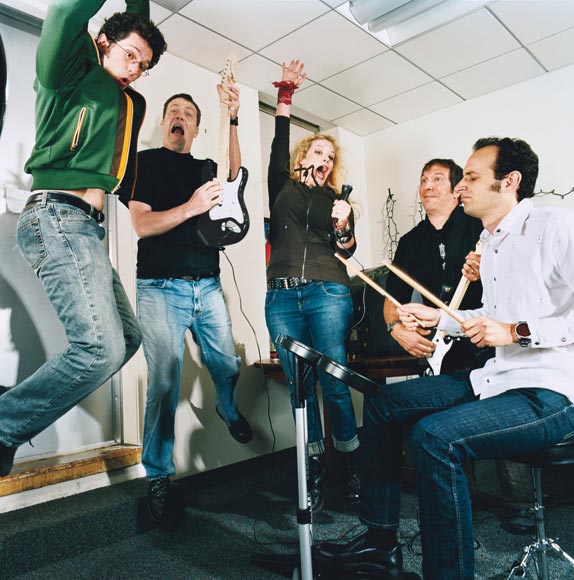
But other issues existed, as well.
It was apparent to just about anyone working in Harmonix's Boston offices that the dynamic between publisher and developer had soured. Harmonix's parent company, MTV, had largely managed to avoid drawing the direct ire of the Harmonix staff through the years, but by 2010, things had taken a turn for the worse. The exact reasoning for that breakdown in relationship is likely complicated and convoluted, but the effect of that breakdown was becoming more and more readily apparent in day-to-day operations. Talk of MTV and Viacom around the company often came with a grumbling tone, one that signaled all was not right with the world.
On my last day, I said my goodbyes, packed up my things, and girded myself for an exit interview with Harmonix CEO Alex Rigopulos, a man who throughout my tenure there had gone out of his way to make me feel not like some random game journalist who had perhaps mistakenly wandered into their menagerie of crazy people, but like one of the family.
When I finally sat down to lay it all out for him--my new job offer, my personal grievances with the MTV situation, and whatever else was on my mind--he sat behind his desk, listening, seemingly absorbing what I was telling him. He then let out a sigh, scratched his head, and said something that always stuck with me.
"I wish I could tell you things were going to get better in the near future. But I don't think I can honestly say that."
Most CEOs will put on a brave face, even in one-on-one situations with their employees. Alex didn't do that. He was straight with me, and exuded a similar kind of weary frustration--likely one several orders of magnitude more intense than my own--at the same exact problems.
Not long after the release of Rock Band 3, and just a short week after the debut of the company's newest franchise, Dance Central, Harmonix and Viacom made it very public that things were just not working anymore. Viacom announced its intent to sell the company, prompting a great deal of speculation as to where Harmonix might be headed. In truth, Harmonix was headed right back to where it started, albeit now a bit more famous than when it began. Through a combination of debt transference, venture capital, and creativity, Harmonix Music Systems returned to independence.
The year since that split-and-sale has been a rough one for the developer, albeit mostly behind the scenes. There have been layoffs, there's been restructuring, and Rock Band, the developer's once flagship franchise, has seen sales dip significantly, especially so with last year's critically-acclaimed, but only marginally bought Rock Band 3. Dance Central, the studio's first foray onto Microsoft's Kinect, helped keep the studio afloat with strong sales for a far less capital intensive title, but the question on many people's minds remains: where does Harmonix go from here?
A few weeks back, I had the chance to sit down and talk to three members of Harmonix's top brass, including senior VP of product development Greg LoPiccolo, co-founder and CTO Eran Egozy, and co-founder and CEO Alex Rigopulos. Of course, omnipresent Harmonix communications boss, John Drake, was there, too. Each granted me the chance to ask a wide array of questions regarding Harmonix's past, present, and future, and each were refreshingly candid.
In this part of the interview, the trio discuss the Rock Band franchise, the years of fierce competition with Rock Band competitor Guitar Hero (and its publisher Activision), and talk a bit about the breakup between Harmonix and MTV Games.
GB: Seems like it's been quite a year for you guys. How are you guys doing following all of the drama with Viacom and MTV?
Greg LoPiccolo: It's been a tumultuous year. A lot of work and scrambling to reconstitute ourselves after parting ways with MTV, but I think we've achieved a new equilibrium. For me, it's all about what we're making, and we're making a lot of cool stuff. I'm excited about everything we're doing.
Eran Egozy: Yeah, 2010 was a hard year. Certainly to me, it feels very different now.
GB: What's the fundamental difference to you?
EE: We own the joint!
GB: Is it weird going from owning the joint to not owning the joint to owning the joint again?
EE: Yeah, but it's good. We had forgotten what it feels like. I mean, when we were first bought by Viacom, there was a lot of excitement, like, "Oh cool, we're being bought by MTV," and there's all this excitement around that. But then it started not working out that well, plus you have this whole corporate bureaucracy thing, which is tough. That's not about Viacom specifically, but you know, being owned by a big company, it's different, it's hard. So when we got released, a lot of things changed. Like, we make up our own policies, and we have to implement them. And there were a lot of things that we wanted to do that we couldn't do before.
GB: What sort of things do you mean?
EE: For example, how to structure employee benefits and compensation plans. Obviously Viacom had their whole system, but you know, what if we wanted to do something different? It's tougher, then. Large corporations, by nature, are not really able to offer up any exceptions to that kind of thing. They worked with us pretty well, but there were some things that were tougher.
The other thing that I think is much easier now is that, well, we're no longer a publisher. So, before, it was like Harmonix and MTV Games as a unit produced these Rock Band games and dance games, and also published them. While that's cool on the one hand, you actually lack flexibility, because you can't really publish with anyone else, you have to be published by MTV. So now it's like, they're not there anymore, we have no choice but to find publishers for our games. That also means we're having conversations with everyone, we're talking to lots of different people, and depending on what project we're working on, we can determine the right publisher on a project-by-project basis. Projects are all different shapes and sizes, so there's more flexibility now built into how we do business.
On the flipside, we don't have a big corporate backer anymore.
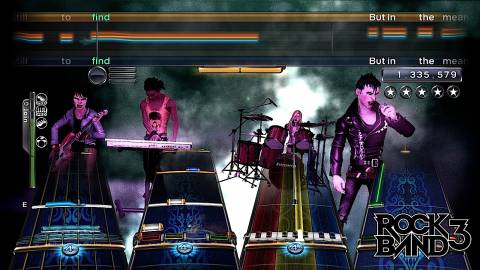
GB: I guess that could be kind of a safety net.
EE: Yeah, it could. I think you subconsciously start thinking of it that way, even if maybe you shouldn't. But now, it's like, "Oh, this is just us now," so you don't have anyone else to fall back on. It's a little more "do or die," which some might find more stressful, but me personally, I find more liberating this way.
Alex Rigopulos: Obviously it adds an edge to have to worry about things like making payroll again. Freedom comes at a price. I think that all of us would eagerly pay that price considering if it means we have control of our own destiny again.
GB: I noticed walking in here today that things definitely feel a bit more fancy free than when I left the company. Has the mood noticably shifted since the sale? Has the "cloud," so to speak, lifted?
GLP: For me personally, absolutely. There's a sense that whatever success we have as a company, it's all in our hands now. If we make good stuff that people like, it will do well. And that's a nice position for us to be in. So much of our focus now is just coming up with great product concepts and executing them.
AR: In most respects I think it's lifted. We have a lot of new challenges now. We went from being part of a big company to not being a part of a big company overnight, which means that there were some basic things we suddenly had to fix. In terms of having a finance department, having a legal department, and back office functions, we just didn't have any of that stuff. So the whole last year has just been a scramble to reestablish ourselves as a fully functioning, independent entity. There's been a lot of challenges around that.
That's the downside. The upside, however, is that we have autonomy again. We have control of our own destiny, and that's been really invigorating. Also, creatively, it's been a rebirth for the studio. Fortunately, our newest game has been a big hit, which means that we're on solid footing financially. There are a lot of changes afoot in the industry, which create a lot of new creative opportunities for us a studio, and we've been doing a lot of ideation around new IPs. It's a new beginning for us. There's a lot of new freedom of action that we didn't have before.
GB: I imagine that going from Harmonix's indie roots to the Viacom corporate machine must have been a fairly daunting experience for you. What changed the most for you in terms of your outlook on the industry, and even your own company?
AR: Despite the greivances I've touched on, I, and a lot of people here, learned a hell of a lot during that period. The business grew so much. We were just a development studio for most of our history, and our business exploded over the course of a couple of years. And because the publishing organization at MTV was a fledgling business, a lot of the senior staff at Harmonix got pulled into the publishing side of the business in a way that we never really had to in our prior lives. A lot of folks here learned an enormous amount about "the business" and just business in general through the trial-by-fire during the crazy years of the Rock Band explosion. So one of the main things is that there was an incredible general knowledge increase which happened as a result of that experience, which has translated directly into skills that we can put into practice now as an independent studio that is also aspiring to become an independent publisher, especially in the realm of digital content.
It was a massively valuable education. A difficult one, but a hugely important one.
GLP: I feel like the conventional storyline was, like, 'We got bought by Viacom and it was hard, and now we're indie and that's cool," and there is some truth to that. It's also true that the whole Rock Band franchise, which was this huge ambition we had, we never could have done without Viacom. There was no way we could have ever accomplished that without MTV and Viacom. From that perspective, I have a deep sense of satisfaction about the relationships we built there, the work we did together, and a sense of gratitude that they were willing to muster up a ton of money and resources to have that come to pass.
EE: Honestly, the biggest thing from that time period for me was this enormous growth we undertook. You were there when we were like, maybe 300 people, right?
GB: Yeah, just under 300 when I started (in June of 2008).
EE: That's a really big studio. When we started, obviously it was just Alex and I, but when we got to the first Guitar Hero, we had maybe sixty or so employees. Something like that. That's a nice size. You're buddies with everyone, you know everyone, it feels like a comfortable environment. Then you get to 100, then 200, and eventually 300. By then, it's impossible to know everyone's name anymore. So for me, I think the biggest change was this sense of a company, and what it turned into.
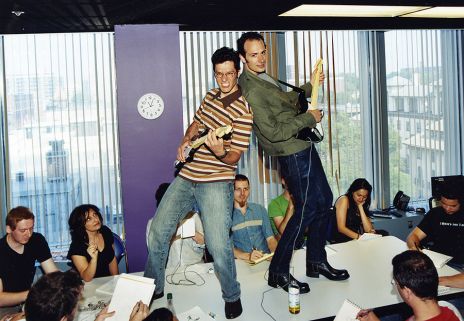
GB: Was that something that was worrisome to you?
EE: Yeah, we were trying to do so much so quickly, with fierce competition from Guitar Hero when we started Rock Band, so we were forced to grow so much so quickly, just to deal with all the incoming stuff. So many project opportunities, so many different things to have to worry about, not to mention the insanity of manufacturing hardware in China. We knew we had to do it, we hunkered down, knew it would be a rough ride, and in the end, I think we came out okay. We had to learn a lot about being a bigger company while retaining that Harmonix spirit. And I think we were largely very successful.
GB: Putting it in simplified terms, what did the split between Viacom and Harmonix ultimately stem from?
AR: Ultimately, Viacom came to a point where they had to make a descision vis-a-vie the games business, and where they wanted to go with that. And for reasons that I think are legitimate, they decided it was not an area they wanted to invest in. Which naturally led to their divestigure from Harmonix, which created a great new opportunity for us to have a rebirth as an independent studio, which is something everyone here embraced.
GB: Do you look back at the original Viacom sale and ever regret going that route? Or do you think they brought enough to the table to cancel out the negative experiences?
EE: I think it was really important for us to join forces with MTV when we did. The things we achieved with Rock Band, I don't really think we could have done without them being there. It was important for us to partner up with someone big, someone with some muscle to help us go after the things we needed, and MTV in particular seemed a great fit because of the music connections there. It helped us go after much bigger artists than we could have otherwise. I don't think a Beatles deal would have happened without the MTV connection, for just one instance.
GLP: It wouldn't have happened. Rock Band wouldn't have happened without their involvement. I'm glad it happened, because I think what we did was pretty cool. When you look back on it, it was pretty crazy. I remember people at the time saying it was crazy. 'So, wait, what? There's going to be a box, and it's going to cost like $170, and retailers are going to actually stock this, and it's all going to work, and people are going to set this up in their living rooms..." If you think about it, it's sort of nutty. But they did help us. We had to figure out how to set things up in China, we had to send people to China, that was a whole drama unto itself.
GB: I imagine that was a trip.
GLP: We employed thousands and thousands of people making plastic instruments. It was nuts.
EE: There were negatives, certainly. The recession hit, obviously, and that affected everyone, not just us. I just think that sometime in 2010 it became clear to both parties that it was probably best to part ways. Their interests seemed to be heading elsewhere, away from games. I think maybe they realized this was something they weren't interested in fully investing in, which is fine. So how it turned out there was fine, too, because at the time we realized it wasn't the right fit anymore, we were able to split amicabally, and now we can both go and move on to do what we want.
GB: So you'd do it over again in a heartbeat?
AR: I would absolutely do it again. Realistically, I think we had very little choice but to become part of a part of a bigger company at that time, because essentially this category was exploding.
GB: Was (former Guitar Hero publisher) RedOctane not going to be able to handle that on their own?
AR: It's actually possible that if RedOctane had remained independent, we may have remained independent as well, and rode that wave with RedOctane. But once they were acquired by Activision, it became apparent that we had to become part of a large organization, because it was going to be a ferocious battle for this category. It was going to be very capital intensive, very expertise intensive in a way that we were just not equipped to handle as a small independent studio. So, if I had to do it all over again...there are aspects of how the subsequent years unfolded that I would have done very differently, but the decision to be acquired, I think we had very little choice.
GB: The plastic instrument explosion was a pretty nutty time for all involved, as I recall. Was there ever a moment where you just stopped, looked around, and went, "How the hell did I get here?
GLP: Obviously getting to work with The Beatles, having them out on stage at E3 and...actually, for me, it was just the making of that game, and then watching the cutscene at the end of it. It's the end of the game, it's the end of their career, there's a beautiful cutscene where the world is wholly in bloom, that to me was like an amazing expression that came out of that...that was about as well as we ever hoped to do in terms of making a video game about music that we love, and having it go someplace. That was a cool place for it to go.
AR: For me, that was pretty much every month during the period of 2007/2008. The launch of Rock Band, and the year thereafter, it just...this business had gone from pretty much not existing from being the largest single category by revenue in the entire video game industry in two years. It was insane.
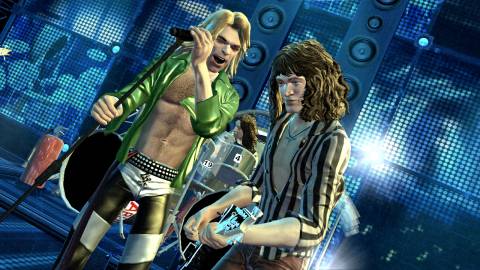
GB: In some ways, Activision's prediction that the plastic instrument genre was just a fad proved true, though some might argue that their approach led to a self-fulfilling prophecy. Do you buy into their notion of the genre merely being a fad? Or do you think something else led to the eventual softening of the genre?
AR: The conventional explanation is that the category died because Activision oversaturated it with too many releases. I think that there is probably some truth to that, but I also think that people like very neat, tidy, causal explanations that are, in fact, generally much more complicated phenomena. I think there are many different contributing factors to the decline of the genre. One of is that one, the conventional explanation, the other is that I think that there actually is some fad element to it, that regardless of how many titles Activision released, it was going to decline in popularity. I also think there's some macro-economic variables. These were the most expensive games in the industry during a historic recession. It wasn't easy to be selling a $200 game when people were losing jobs and had declining incomes. I guess my point is that it's complicated, as these things tend to be.
GB: I'd heard through the grapevine that you (Alex) met with Bobby Kotick not long after the sale news became public. What prompted that?
AR: I have met with Bobby on a number of occasions. Most recently, I think it was shortly after Harmonix's departure from Viacom. Honestly, it was just to open communication. There had been such a chill in communication during the heart of the wars, so to speak, that this was just essentially an attempt to thaw that a bit, bury the hatchet, open a dialogue to see if there was any potential for collaboration between the two companies. Not even necessarily on the Rock Band/Guitar Hero front, just in general.
GB: Was it successfully thawed?
AR: I don't consider the fact that we were intense competitors in the past to necessarily preclude the idea that we could work together on the right thing in the future. I think so.
GB: Considering the insane number of features Rock Band 3 came out with, one does have to wonder if Rock Band is something that can still be innovated on in its current form. Do you think it can be?
GLP: Absolutely. We're thinking hard about that, how to move it forward. I'm confident in saying on the record that we have not abandoned the Rock Band franchise, we think there's a lot of creative life left in it, and we're extremely excited in the creative opportunities we think are there.
AR: We definitely plan to keep releasing weekly DLC, we're at what, like 200 weeks now?
John Drake: Yup! Almost four years straight of weekly DLC.
AR: So we still have a loyal audience who continues to show up weekly to gobble up our weekly releases. That actually continues to be a profitable business for us, which is nice. And then we have the relaunch of Rock Band 3 with Mad Catz this holiday season. It's a Metacritic 93 title you can buy at retail for $19.99, so if you're still playing an older Guitar Hero or Rock Band game, it's a great value.
So in the short term we're basically continuing to attend to that business as we have been. In the longer term, looking into next year, we're actually considering fairly fundamental creative reinterpretation of what the Rock Band business is. We're committed to the franchise, but when I think that when we do things with it in the future, it's going to be a pretty dramatic departure from what we've done before.
GB: Undoubtedly the DLC market has been huge, but at a point that does seem sort of like preaching to the choir, satiating the audience you already have locked down. Is there something you believe you can do to extend beyond that existing fanbase?
AR: I'd love to talk at great length about that, of course. I'm reluctant to say too much about where we're headed with it right now, except to reiterate that it's a pretty radical departure.
EE: It's interesting. We do have plans on where we're going to go with Rock Band and how we plan to expand it. All I'll say for now is that it isn't what you think. You might assume we're going to add saxophone or something along those lines, but no, the kind of direction we're planning on taking Rock Band, the kind of innovation we have in mind, is taking it in a different direction, one that's more suitable to the kind of environment we're in, what people are doing now, what they're interested in playing now, versus, say, 2007.
GB: So there are some strong ideas then?
EE: It's more than ideas. We are working on it, and we have forward progress. It's an exciting, fresh take on it. I'll leave it at that.
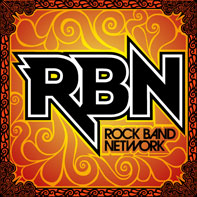
GB: How has the Rock Band Network initiative been going for you guys? Has it morphed into the free-flowing network of independent artists you'd initially designed it to be?
AR: Yes and no. On one level, it was a successfully realized vision, in that it is this platform where independant artists at relatively low cost can get their music onto the platform so that their fans can reach their music in this way, and new fans can try it for the first time, and all of that. It's all true. At the same time, we have to acknowledge that that innovation came at a time when the Rock Band business was at a fraction of its peak size. If I could rewind the clock, it would have been amazing to bring that to light in 2007, or 2008 so that the addressable audience would have been larger than it was when it actually launched.
GLP: The community for Rock Band Network has been amazing. It was a real challenge mechanically to bolt that thing together and make it work, but it does work. And the community rose up around it in a way that, well, if they hadn't, it WOULDN'T have worked. It's such a community-driven feature. It has remained viable, we're still pushing songs through every week, and again, we have a bunch of ideas that we'll probably be able to divulge in the future.
GB: So you believe there's room to innovate on Rock Band Network as well?
GLP: Oh yeah. What it is is this robust pipeline for anybody who wants to push content through this pipe--how this content is used and what people want to do with it, that's a bit more speculative where we want to take that. But absolutely, it's been a huge success.
GB: Going a step further, I then have to ask how closely Rock Band as a franchise, or a platform has achieved the vision you had for it initially as well. Obviously nothing's going to look exactly how it did in your head, but is it the platform you'd wanted it to become when the idea was first put into production?
AR: For the most part. Over the course of multiple iterations of the title, we really did get to build the dream incarnation of the game that we had all been envisioning for quite some time. Everything we wanted to do with the game we eventually got to do. That said, as a game developer, or any kind of creative type, you're never DONE. Any time you finish, you look at it, and you go, "You know, here's like 11 things I would like to do differently the next time around." There are always lessons you take away, and I think some of those lessons will be applied in future directions of the franchise.
GB: Looking back over the last several years, is there anything you regret? Any decision made, or event from the great plastic instrument wars that you would do differently?
AR: Hah, so many mistakes to choose from!
JD: Hiring you!
GB: Zing.
AR: The one example...the Rock Band/Guitar Hero wars turned into a cold war style arms race. It was insane. One one level, intense competition is great. It's great for consumers, it brings out the best in competitors. I think generally speaking intense rivalries are a great thing for everyone involved. But in the case of the Guitar Hero/Rock Band wars in particular, the arms race kinda got out of control. In terms of things like inventory levels that were being built and shipped into retail, bidding wars on music, etc. The quest for dominance got so intense that I think it provoked both Activision and MTV Games/Harmonix to do things that were...irrational is maybe too strong a word, but not prudent business decisions in regard to that quest for dominance.
GLP: I think we handled it as best we could, though ultimately it wasn't really our choice. The arms race, I mean. The sense that Activision was putting out Guitar Hero, and everything was moving really quickly, there was tons of stuff coming to market all the time, and we kind of had to stay on top of that. Insofar as that led to the bubble, that makes me a little sad, because I love Rock Band.
GB: Hell, I still play it, but then, I suppose I'm the choir.
GLP: A lot of people still play it! Because people keep buying the DLC from us. We track the online stats, and there is still a very robust community out there. I hope people keep playing it, and I hope that we continue to put products out from that line. Because I think it's an awesome game, and we poured a huge amount of creativity and love into it, and we want to keep it going. Obviously we were thrilled with how well it did, and how many copies we sold and so on and so forth. The bubble aspect of it though, that wasn't really our plan, exactly. That just kind of happened to us.
EE: If there's anything for me, I guess I sort of wish that we had gotten our act together sooner. You know about the earlier years of Harmonix, where we weren't even really making games. It took us a while to get our footing. Frequency, which I think was our first great achievement in music gaming, came out in 2001, a full six years after we got started.
There have been some rough rides here and there, not everything has panned out. But since we got into games, I've been really proud of all the products we've made. And we have great plans to continue innovating as we have been.
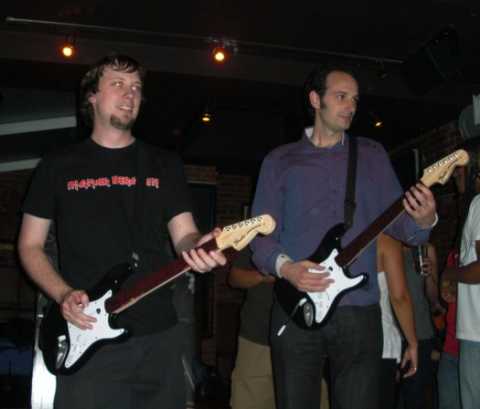
GB: On the flipside of that, what is the thing you look back on with the most pride? What's the moment you will always point to, and say, "That right there is the greatest thing I was involved with during those years?"
EE: Wow, well, there's a lot. (laughs). I guess there's two levels. One is the products that we've made. What Rock Band has allowed to happen in the world I think is just amazing. How it's gotten people together. Even still now, we still hear all these awesome stories of people getting together, playing Rock Band, and having a blast. On the other side, it's the company. It's Harmonix itself. It's not only the products we've made, but the people we have here. It's the kind of company we've been able to grow, it's amazing. I'm psyched to come into work every day, because we work with really amazing people. I think we all share this vision of doing something big, and bold, and new. We're interested in innovating, we're interested in giving people new kinds of experiences. I think we've done that so far in the genre of music games, but I think now we're possibly looking to expand beyond that. But whatever it is we do, we aim to make it innovative. It's going to try to give people new experiences they haven't had before.
GLP: For me, that thing is Rock Band. Pick your version, say the first one, spinning that thing up, rolling it out on Thanksgiving, having my family and other families get their heads around it, and suddenly there are hundreds of thousands of little fake Rock Bands all over the world. That was pretty awesome. And even now, you go to a game conference or something, seeing people crank it up even today. That's amazing.
AR: It's hard to pick one thing. But there are specific moments that happen again and again that persistently remind me why we deal with the stress we deal with day in and day out. It's a pretty stressful job, we all work very hard, and we all carry around very high levels of stress every day. But the periodic moments that remind me "Oh, god, yeah, this is why we do this" is when we go out into public spaces. There hasn't been any one moment, but almost any time we go out to a Rock Band bar night, wherever it might be, and you just see people playing the game, you see the joy on their faces when they're playing the game, it's incredibly gratifying to creative people to see the fruits of their labor having that effect on real people out in the world.
I actually make a point, whenever work has me down, because it's been too brutal for one reason or another, to actually get out into the world and actually try and see people playing the products and the games we've made because it's an important reminder of why it's worth it.
--
Check back to the site later this week for part two of our Harmonix interview, in which we tackle the Dance Central franchise, Kinect, other motion controlling technologies, and Harmonix's future direction.
83 Comments